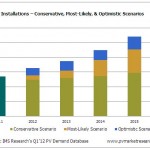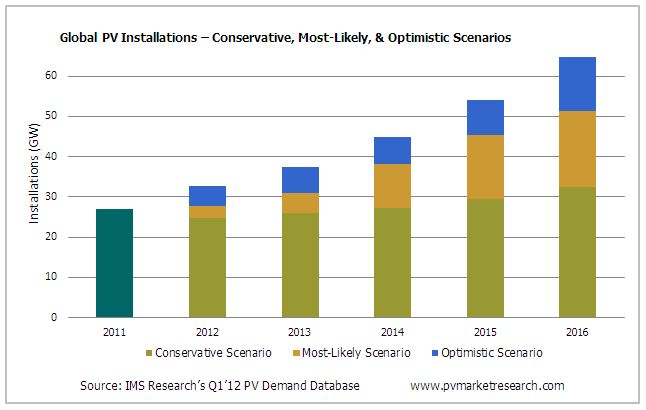 Global solar panel installations will grow by between 4 and 21 percent in 2012, according to a new report from IMS Research. Global solar panel installations will grow from 27 GW in 2011 to 28-33 GW in 2012. These growth expectations are lower that previous years, and hence the solar panel manufacturer overcapacity situation will remain.
Global solar panel installations will grow by between 4 and 21 percent in 2012, according to a new report from IMS Research. Global solar panel installations will grow from 27 GW in 2011 to 28-33 GW in 2012. These growth expectations are lower that previous years, and hence the solar panel manufacturer overcapacity situation will remain.
The pick-up in demand is driven by falling system prices (down 50% compared to a year ago), a rush to beat incentive cuts (like just happened in the UK), and the growing number of mid-sized emerging PV markets (at least 23 counties will install 100 MW or more this year, up from just 17 last year). The resulting market growth expectations are as follows:

To put these numbers in perspective, an normal household installation in the UK is 4kWp (16 panels). When you have 1.000 of these installations you talk about 4MWp (Mega-watt-peak) and when you have 1.000.000 (one million) of these installations you talk about 4GWp (Giga-watt-peak). Hence a global market of 33 GWp equals more than 8 million rooftop installations – about 1/3 of the number of UK households, every year!
However, the global capacity for production of solar panels by the end of 2011 is about 50GW – an increase of over 50 percent since the start of last year. Therefore, factories around the world can produce enough solar panels every year to supply 12 million UK rooftop installations of 16 panels each. Hence the situation of chronic overcapacity is expected to remain, which has been the key driver to strong price drops since early 2011.
This overcapacity has been squeezing margins from solar panel manufacturers, and (nearly) all of them reported quarterly losses in the last quarter. This situation cannot remain, and either capacity should decrease or demand should pick up. CompareMySolar expects capacity to decrease slightly (especially in China), but it can simply linger and be activated at the turn of a switch. We expect more about demand growth, and based on demand growth we’ve witnessed in the Dutch market recently (which has no subsidy whatsoever) we expect demand growth in 2012 to significantly exceed expectations.